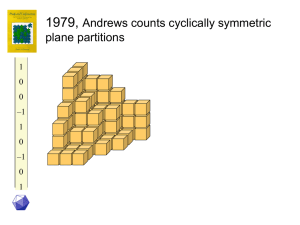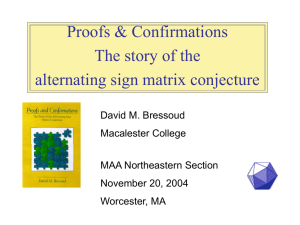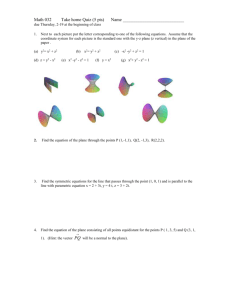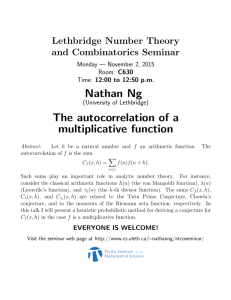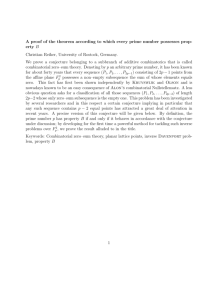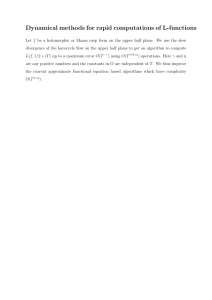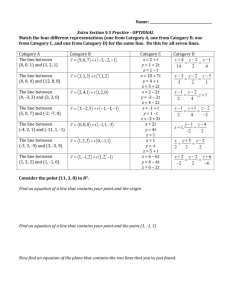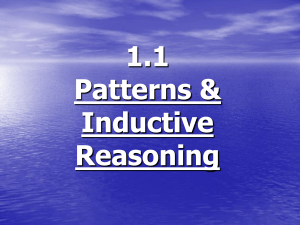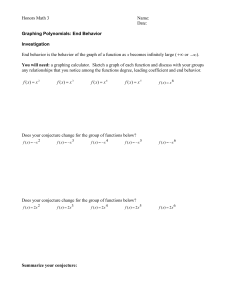A n - Macalester College
advertisement
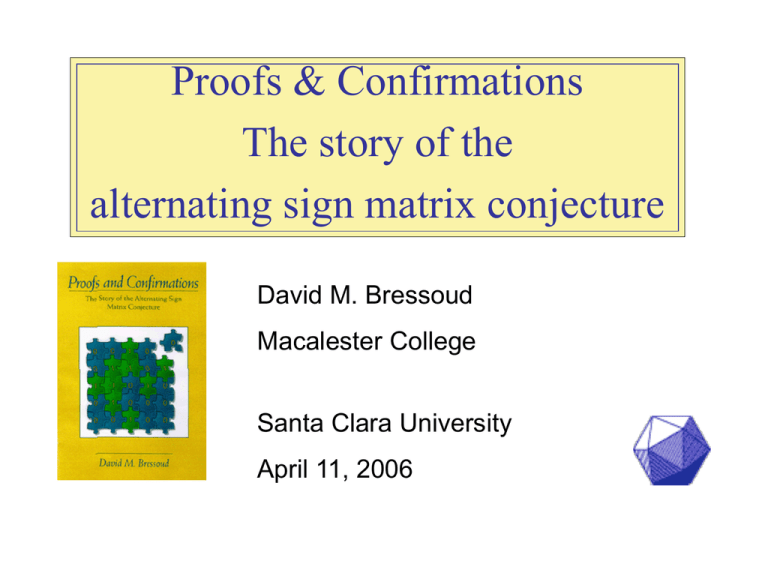
Proofs & Confirmations The story of the alternating sign matrix conjecture David M. Bressoud Macalester College Santa Clara University April 11, 2006 Bill Mills 1 IDA/CCR 0 0 Howard Rumsey –1 1 0 –1 0 1 Dave Robbins Charles L. Dodgson 1 aka Lewis Carroll 0 0 –1 1 0 –1 0 1 “Condensation of Determinants,” Proceedings of the Royal Society, London 1866 n An 1 1 1 2 2 0 3 7 0 4 42 5 429 6 7436 –1 7 218348 0 8 10850216 1 9 911835460 –1 1 0 1 0 n An 1 1 2 2 3 7 How many n n alternating sign matrices? 0 4 42 = 2 3 7 –1 5 429 = 3 11 13 1 6 7436 = 22 11 132 0 7 –1 0 1 8 9 218348 = 22 132 17 19 10850216 = 23 13 172 192 911835460 = 22 5 172 193 23 1 0 n An 1 1 2 2 3 7 0 4 42 = 2 3 7 –1 5 429 = 3 11 13 1 6 7436 = 22 11 132 0 7 –1 0 1 8 9 218348 = 22 132 17 19 10850216 = 23 13 172 192 911835460 = 22 5 172 193 23 n An 1 1 1 2 2 0 3 7 0 4 42 5 429 6 7436 –1 7 218348 0 8 10850216 1 9 911835460 There is exactly one 1 in the first row –1 1 0 n An 1 1 1 2 1+1 0 3 2+3+2 0 4 7+14+14+7 There is exactly one 1 in the first row –1 1 0 5 6 –1 7 0 8 1 9 42+105+… 1 1 1 0 2 0 7 –1 42 1 0 –1 0 1 429 1287 1 3 14 105 2002 2 14 135 7 105 2002 42 1287 429 1 1 1 0 2 0 42 1 –1 0 1 3 2 7 + 14 + 14 + 7 –1 0 1 429 1287 105 2002 135 105 2002 42 1287 429 1 1 1 0 2 0 42 1 –1 0 1 3 2 7 + 14 + 14 + 7 –1 0 1 429 1287 105 2002 135 105 2002 42 1287 429 1 1 1 2/2 1 0 2 2/3 3 3/2 2 0 7 2/4 14 –1 1 0 –1 0 1 42 2/5 105 429 2/6 1287 2002 14 4/2 7 135 105 5/2 42 2002 1287 6/2 429 1 1 1 2/2 1 0 2 2/3 3 3/2 2 0 –1 7 2/4 14 5/5 14 4/2 7 1 42 2/5 105 7/9 135 9/7 105 5/2 42 0 –1 0 1 429 2/6 1287 9/14 2002 16/16 2002 14/9 1287 6/2 429 2/2 1 2/3 0 2/4 0 –1 2/5 1 0 –1 0 1 2/6 9/14 3/2 5/5 7/9 4/2 9/7 16/16 5/2 14/9 6/2 Numerators: 1+1 1 1+1 0 0 –1 1 0 –1 0 1 1+2 1+1 2+3 1+1 1+3 3+4 3+6 1+4 1+1 4+5 6+10 4+10 1+5 1+1 Numerators: 1+1 1 1+1 0 0 –1 1 1+1 0 1 2+3 3+4 1+3 3+6 1+4 1+1 4+5 6+10 4+10 0 –1 1+2 Conjecture 1: An, k An,k 1 1+5 n 2 n 1 k 1 k 1 n 2 n 1 n k 1 n k 1 1 Conjecture 1: 0 An, k An,k 1 n 2 n 1 k 1 k 1 n 2 n 1 n k 1 n k 1 0 –1 Conjecture 2 (corollary of Conjecture 1): 1 0 –1 0 1 3 j 1! 1!4!7!L 3n 2 ! An n!n 1!L 2n 1! j 0 n j ! n1 1 0 0 –1 1 0 –1 0 1 Richard Stanley 1 0 0 Richard Stanley –1 1 0 –1 0 1 Andrews’ Theorem: the number of descending plane partitions of size n is n1 3 j 1! 1!4!7!L 3n 2 ! An n!n 1!L 2n 1! j 0 n j ! George Andrews 1 0 0 –1 1 0 –1 0 1 All you have to do is find a 1-to-1 correspondence between n by n alternating sign matrices and descending plane partitions of size n, and conjecture 2 will be proven! 1 0 0 –1 All you have to do is find a 1-to-1 correspondence between n by n alternating sign matrices and descending plane partitions of size n, and conjecture 2 will be proven! 1 0 –1 0 1 What is a descending plane partition? Percy A. MacMahon Plane Partition 1 0 0 –1 1 0 –1 0 Work begun in 1 1897 Plane partition of 75 6 5 5 4 3 3 1 0 0 –1 1 0 –1 0 1 # of pp’s of 75 = pp(75) Plane partition of 75 6 5 5 4 3 3 1 0 0 –1 1 0 –1 0 1 # of pp’s of 75 = pp(75) = 37,745,732,428,153 Generating function: 1 0 0 –1 1 pp j q j 1 q 3q 2 6q 3 13q 4 K j 1 k 1 1 0 –1 0 1 1 1 q k k 1 q 1 q 1 1 q L 2 2 3 3 1912 MacMahon proves that the generating function for plane partitions in an n n n box is 1 q i j k 1 i jk2 1i, j,k n 1 q 1 0 0 –1 1 0 –1 0 1 At the same time, he conjectures that the generating function for symmetric plane partitions is i j k 1 1 q i jk2 1 q 1i j n 1 k n 2 i j k 1 1 q 2 i j k 2 1 q 1i j n 1 k n Symmetric Plane Partition 4 3 2 1 1 1 3 2 2 1 0 2 2 1 0 1 1 –1 1 1 0 –1 0 1 “The reader must be warned that, although there is little doubt that this result is correct, … the result has not been rigorously established. … Further investigations in regard to these matters would be sure to lead to valuable work.’’ (1916) 1971 Basil Gordon proves case for n = infinity 1 0 0 –1 1 0 –1 0 1 1971 Basil Gordon proves case for n = infinity 1 0 0 1977 George Andrews and Ian Macdonald –1 independently prove general case 1 0 –1 0 1 1912 MacMahon proves that the generating function for plane partitions in an n n n box is 1 q i j k 1 i jk2 1i, j,k n 1 q 1 0 0 –1 1 0 –1 0 1 At the same time, he conjectures that the generating function for symmetric plane partitions is i j k 1 1 q i jk2 1 q 1i j n 1 k n 2 i j k 1 1 q 2 i j k 2 1 q 1i j n 1 k n Macdonald’s observation: both generating functions are special cases of the following B r, s,t i, j, k 1 i r,1 j s,1 k t 1 0 0 –1 1 0 –1 0 1 ht i, j, k i j k 2 1 q generating function ht 1 q B /G 1 ht where G is a group acting on the points in B and B/G is the set of orbits. If G consists of only the identity, this gives all plane partitions in B. If G is the identity and (i,j,k) (j,i,k), then get generating function for symmetric plane partitions. Does this work for other groups of symmetries? 1 0 0 –1 1 0 –1 0 1 G = S3 ? Does this work for other groups of symmetries? 1 0 0 –1 1 0 –1 0 1 G = S3 ? No Does this work for other groups of symmetries? 1 0 0 –1 1 0 –1 0 1 G = S3 ? No G = C3 ? (i,j,k) (j,k,i) (k,i,j) It seems to work. Cyclically Symmetric Plane Partition 1 0 0 –1 1 0 –1 0 1 1 0 0 –1 Macdonald’s Conjecture (1979): The generating function for cyclically symmetric plane partitions in B(n,n,n) is 1 ht 1 q ht B /C3 1 q 1 0 –1 0 1 “If I had to single out the most interesting open problem in all of enumerative combinatorics, this would be it.” Richard Stanley, review of Symmetric Functions and Hall Polynomials, Bulletin of the AMS, March, 1981. 1979, Andrews counts cyclically symmetric plane partitions 1 0 0 –1 1 0 –1 0 1 1979, Andrews counts cyclically symmetric plane partitions 1 0 0 –1 1 0 –1 0 1 1979, Andrews counts cyclically symmetric plane partitions 1 0 0 –1 1 0 –1 0 1 1979, Andrews counts cyclically symmetric plane partitions 1 0 0 –1 1 0 –1 0 1 1979, Andrews counts cyclically symmetric plane partitions 1 0 L 1 = W1 > L 2 = W2 > L 3 = W3 > … 0 –1 1 width 0 –1 0 1 length 1979, Andrews counts descending plane partitions 1 0 L 1 > W1 ≥ L 2 > W2 ≥ L 3 > W3 ≥ … 0 –1 1 6 6 6 4 3 width 3 3 0 –1 2 0 1 length 6 X 6 ASM DPP with largest part ≤ 6 What are the corresponding 6 subsets of DPP’s? 1 0 0 –1 1 6 6 6 4 3 width 3 3 0 –1 2 0 1 length ASM with 1 at top of first column DPP with no parts of size n. 1 0 ASM with 1 at top of last column DPP with n–1 parts of size n. 0 –1 1 6 6 6 4 3 width 3 3 0 –1 2 0 1 length 1 Mills, Robbins, Rumsey Conjecture: # of n n ASM’s with 1 at top of column j equals # of DPP’s ≤ n with exactly j–1 parts of size n. 0 0 –1 1 6 6 6 4 3 width 3 3 0 –1 2 0 1 length Mills, Robbins, & Rumsey proved that # of DPP’s ≤ n with j parts of size n was given by their conjectured formula for ASM’s. 1 0 0 –1 1 0 –1 0 1 1 0 0 –1 1 0 –1 0 1 Mills, Robbins, & Rumsey proved that # of DPP’s ≤ n with j parts of size n was given by their conjectured formula for ASM’s. Discovered an easier proof of Andrews’ formula, using induction on j and n. 1 0 0 –1 1 0 –1 0 1 Mills, Robbins, & Rumsey proved that # of DPP’s ≤ n with j parts of size n was given by their conjectured formula for ASM’s. Discovered an easier proof of Andrews’ formula, using induction on j and n. Used this inductive argument to prove Macdonald’s conjecture “Proof of the Macdonald Conjecture,” Inv. Math., 1982 1 0 0 –1 1 0 –1 0 1 Mills, Robbins, & Rumsey proved that # of DPP’s ≤ n with j parts of size n was given by their conjectured formula for ASM’s. Discovered an easier proof of Andrews’ formula, using induction on j and n. Used this inductive argument to prove Macdonald’s conjecture “Proof of the Macdonald Conjecture,” Inv. Math., 1982 But they still didn’t have a proof of their conjecture! Totally Symmetric Self-Complementary Plane Partitions 1 0 0 1983 –1 1 0 –1 0 1 David Robbins (1942–2003) Vertical flip of ASM complement of DPP ? Totally Symmetric Self-Complementary Plane Partitions 1 0 0 –1 1 0 –1 0 1 1 0 0 –1 1 0 –1 0 1 Robbins’ Conjecture: The number of TSSCPP’s in a 2n X 2n X 2n box is 1 0 0 –1 1 0 –1 0 1 3 j 1! 1!4!7!L 3n 2 ! n!n 1!L 2n 1! j 0 n j ! n1 Robbins’ Conjecture: The number of TSSCPP’s in a 2n X 2n X 2n box is 1 0 0 –1 1 0 –1 0 1 3 j 1! 1!4!7!L 3n 2 ! n!n 1!L 2n 1! j 0 n j ! n1 1989: William Doran shows equivalent to counting lattice paths 1990: John Stembridge represents the counting function as a Pfaffian (built on insights of Gordon and Okada) 1992: George Andrews evaluates the Pfaffian, proves Robbins’ Conjecture December, 1992 1 0 0 –1 1 0 –1 0 1 Doron Zeilberger announces a proof that # of ASM’s of size n equals of TSSCPP’s in box of size 2n. December, 1992 1 0 0 –1 1 Doron Zeilberger announces a proof that # of ASM’s of size n equals of TSSCPP’s in box of size 2n. 0 –1 0 1 1995 all gaps removed, published as “Proof of the Alternating Sign Matrix Conjecture,” Elect. J. of Combinatorics, 1996. 1 0 Zeilberger’s proof is an 84-page tour de force, but it still left open the original conjecture: 0 –1 1 0 –1 0 1 An, k An,k 1 n 2 n 1 k 1 k 1 n 2 n 1 n k 1 n k 1 1996 Kuperberg announces a simple proof 1 0 0 –1 1 0 –1 0 1 “Another proof of the alternating sign matrix conjecture,” International Mathematics Research Notices Greg Kuperberg UC Davis 1996 Kuperberg announces a simple proof 1 0 0 –1 1 0 –1 0 1 “Another proof of the alternating sign matrix conjecture,” International Mathematics Research Notices Greg Kuperberg UC Davis Physicists have been studying ASM’s for decades, only they call them square ice (aka the six-vertex model ). H O H O H O H O H O H H 1 0 0 –1 1 0 –1 0 1 H H H H H O H O H O H O H O H H H H H H H O H O H O H O H O H H H H H H H O H O H O H O H O H H H H H H H O H O H O H O H O H 1 0 0 –1 1 0 –1 0 1 Horizontal 1 1 0 0 –1 1 0 –1 0 1 Vertical –1 southwest 1 0 northwest 0 –1 1 southeast 0 –1 0 1 northeast 1 0 0 –1 1 0 –1 0 1 N = # of vertical I = inversion number = N + # of NE x2, y3 1960’s Rodney Baxter’s 1 0 0 –1 1 0 –1 0 1 Triangle-totriangle relation 1960’s Rodney Baxter’s Triangle-totriangle relation 1 0 0 –1 1980’s 1 0 –1 0 1 Anatoli Izergin Vladimir Korepin i, j 1 xi y j axi y j 1 det xi y j axi y j 1i j n xi x j yi y j n 1 0 0 –1 1 0 –1 0 1 2 N A n(n1)/2 Inv A 1 a a AA n xi y j vert ax i SW, NE yj x y i NW, SE j i, j 1 xi y j axi y j 1 det xi y j axi y j 1i j n xi x j yi y j n 1 0 0 –1 1 0 –1 0 1 2 N A n(n1)/2 Inv A 1 a a AA n xi y j vert ax i yj x y SW, NE i j NW, SE a z 4 , xi z 2 , yi 1 RHS z z z z 1 n n 1 1 2 N A AA n z e i / 3 n n 1/2 RHS 3 An 1996 1 0 0 –1 Doron Zeilberger uses this determinant to prove the original conjecture 1 0 –1 0 1 “Proof of the refined alternating sign matrix conjecture,” New York Journal of Mathematics 1 0 The End 0 –1 1 0 –1 0 1 (which is really just the beginning) 1 0 The End 0 –1 1 (which is really just the beginning) 0 –1 0 1 This Power Point presentation can be downloaded from www.macalester.edu/~bressoud/talks
